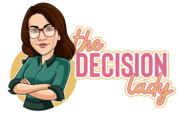What if I told you there was a simple way to trick your brain into making a better decision – and to have more fun in the process?
I’ve belonged to an online group of about a hundred moms since we were all expecting babies in 2017. Over the past seven years, we’ve asked each other thousands of questions for advice, about parenting or otherwise. I’ve gotten used to both doling out advice, and having them as a resource to weigh in on some decisions.
Recently, I was thinking over a problem I was having with my four-year-old daughter. I opened my phone and started tapping out a post to the group, brain-dumping about what a hard time I was having and how confused I felt.
Before I shared with the group for advice, I paused. Suddenly I wondered: what if another mom had posted this question? What advice would I give her?
Like magic, I saw the situation in a whole new light. The options became obvious, the pros and cons clarified. By pretending my own decision was for someone else, I was able to decide for this “other mom” much more easily than for myself.
Science says: this really works.
Why it works
Research has shown that you think about decisions for yourself differently than those you make for others. When deciding on your own behalf, you know you’re going to have to live with the long-term consequences, which brings the costs and negatives of our options to the forefront. This puts you into a cautious decision-making mindset, where you’re more likely to stick with the status quo.
In contrast, when making a decision for someone else, you’re more likely to come from an adventurous standpoint, evaluating the full array of options and examining more information before making a choice. You’’re also more likely to be creative and positive, which makes the decision-making process less stressful and less likely to lead to decision fatigue. This allows you to be more strategic and also evaluate a wider range of options rather than relying on mental shortcuts.
Deciding for others reverses the effects of choice overload, the stress that comes from having too many options in front of you. When deciding for yourself, you prefer to select from a smaller array of options. However, when deciding on behalf of someone else, you actually prefer and are more satisfied with your decision when choosing from among more options.
It is also more fun to choose for others! Evan Polman, the researcher behind much of the science referenced in this post, has found that deciding for others is not only less draining but also more enjoyable than deciding for ourselves.
As a result, Polman says, “Our findings suggest that for some people facing difficult choices, it might help to imagine their own choices as belonging to someone else and deciding on the basis of what that other person should do.”
How to pretend you’re deciding for someone else
How do you go about this role reversal? The first step is to write down the decision you’re making. For me, this might take the form of a draft post to my moms group. You might prefer to write it as an email to a friend or a journal entry. Use this exercise to help you articulate exactly what the question is that you need answered, why it matters, and what your options are. Spend some time on this – it can be illuminating to dig in and put detail to the thoughts in your head.
This step is important because writing things down helps you keep track of all the inputs and factors going into your decision, reducing the strain on your working memory. Writing information down will also make you more confident in your decision, since you’ll know you’ve evaluated all the information and made an attempt to eliminate your biases.
Then, imagine that someone else is posing this question to you and asking for advice. What would you tell them? Write down your ideas here, too. Maintain the illusion and give your advice in the second or third person, too – instead of writing “I should decide…”, go for “you” or “she” should decide. This language shift can make your decision less stressful.
Know that when you decide on behalf of an imaginary “someone else”, you can bring creativity, new perspective, and better choices to your decision-making.
Have you ever imagined a decision you were making for yourself was really for someone else? How did it affect your decision-making process?




I use this perspective with close friends and family sometimes. They’ll ask for advice and I will ask them what they’d tell me to do. It makes things so much simpler!
Love that, Deb. Great idea!